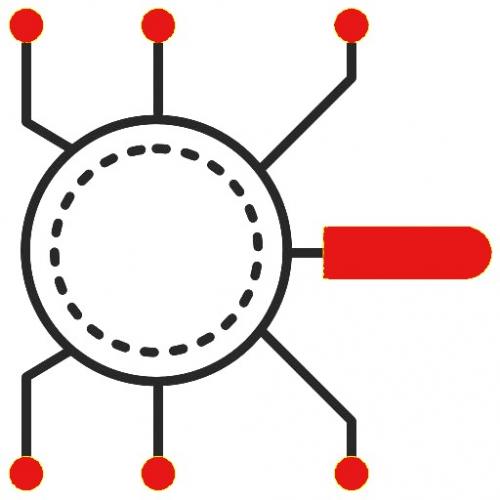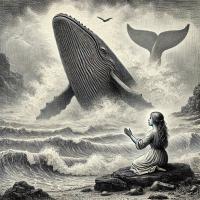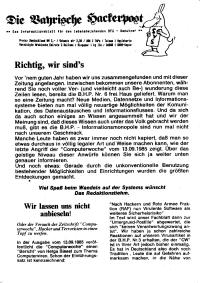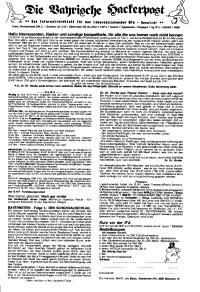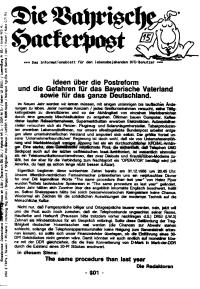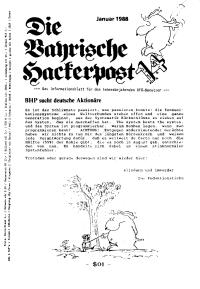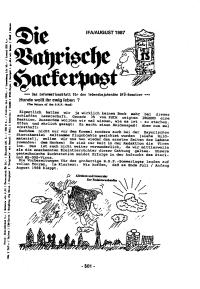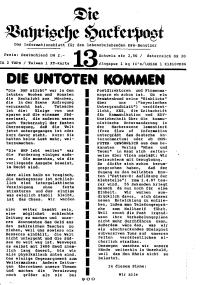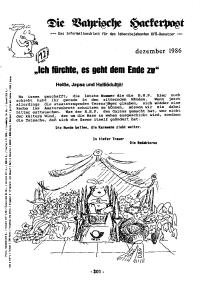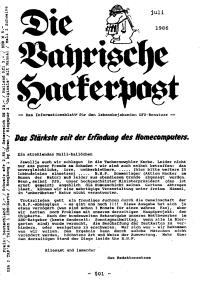Copy Link
Add to Bookmark
Report
IRList Digest Volume 2 Number 51

IRList Digest Thursday, 9 October 1986 Volume 2 : Issue 51
Today's Topics:
Query - Information on Catalog Retrieval System
Announcement - NSF Reorganization
- Computer-Supported Cooperative Work Conf. Program (long)
Software Psychology Society - V. 11 #1, Potomac Chapter Newsletter
----------------------------------------------------------------------
Date: Wed, 1 Oct 1986 12:01 EDT
From: James Nolte <$JSN@CLVM>
Subject: Frakes metion of Catalog
I would like more information about CATALOG, the IR system developed
by Frakes Cox and Leighton at AT&t and mentioned by Frakes in the
article about software reuse. Is it possible to use SIGIR to
enquire about this?
[Note: sure, it would be of interest to all of us. Bill Frakes did
his dissertation work relating to stemming and there are interesting
points about that in Catalog. Bill can tell us all more info. if he
can. - Ed]
------------------------------
Date: Wed, 1 Oct 86 02:33:11 edt
From: DEKEN%NSF.CSNET%relay.cs.net@vpi.csnet
Subject: RE: infrastructure etc.
...
Very briefly, the major impact of the reorganization at NSF, as I
see it, is that the old IST division, as of October 1, will become
IRIS: (Information, Robotics, and Intelligent Systems). In addition
to the three programs from the old IST, the new Division will
take over the old Intelligent Systems Program, which had been
in the Division of Computer Research. After October 1, we have
New Old
--- ---
Division of IRIS Division of IST
Knowledge and Data Based
Systems Program Information Science
Interactive Systems Information Technology
Program
Robotics and Machine
Intelligence Program Intelligent Systems (DCR)
Information Impact Program Information Impact Program
...
Let me know if I can be of any further help.
Joe
------------------------------
Date: Sun, 21 Sep 86 06:58:43 edt
From: csnet_gateway (LAWS@SRI-STRIPE.ARPA)
Subject: Conference - CSCW '86 Program
Following is the program for CSCW '86: the Conference on
Computer-Supported Cooperative Work . Registration material can
be obtained from Barbara Smith at MCC (basmith@mcc).
*** CSCW '86 ***
DECEMBER 3 - 5, 1986
AUSTIN, TEXAS
Tuesday, December 2, 1986
6:00pm - 10:00pm Registration
6:00pm - 10:00pm Reception/Refreshments
Wednesday, December 3, 1986
8:00am - 5:00pm Registration
8:30am - 9:00am Opening Remarks
Welcome: Herb Krasner, Conference Chair
Conference Themes: Irene Greif, Program Chair
9:00am - 10:30am Supporting Face-to-Face Groups
Chair: George Huber
University of Texas, Austin
- Project NICK: Meetings Augmentation and Analysis
Michael Begeman, Peter Cook, Clarence Ellis, Mike Graf, Gail Rein,
and Tom Smith; MCC
- Cognoter, Theory and Practice of a Colab-orative Tool
Gregg Foster; University of California, Berkeley
- A Group Decision Support System for Idea Generation and Issue
Analysis in Organizational Planning
Lynda M. Applegate, Benn R. Konsynski, J. F. Nunamaker
University of Arizona
10:30am - 11:00am Break
11:00am - 12:30am Empirical Studies
Chair: Bill Curtis; MCC
- The Variable Impact of Computer Technologies on the Organization of
Work Activities
Jeanette Blomberg; Xerox
- Cognitive Science and Organizational Design: A Case Study of Computer
Conferencing
Kevin Crowston, Thomas W. Malone, and F. Lin; M. I. T.
- Narratives at Work, Story Telling as Cooperative Diagnostic Activity
Julian Orr; Xerox
12:30pm - 2:00pm Lunch
2:00pm - 4:00pm Supporting Distributed Groups
Chair: Irene Greif; M. I. T.
- Constraints on Communication and Electronic Messaging
Martha Feldman; University of Michigan
- Evolving Electronic Communication Networks: An Empirical Assessment
J. D. Eveland and Tora Bikson; The Rand Corporation
- Semi-Structured Messages as a Basis for Computer-Supported
Coordination
Thomas W. Malone, Kenneth R. Grant, Kum-Yew Lai, Ramana Rao, and
David Rosenblitt; M. I. T.
- The Amigo Project: Advanced Group Communication Model for
Computer-Based Communications Environment
Thore Danielsen, University of Tromsoe, Norway
Uta Pankoke-Babatz and Wolfgang Prinz, Institute for Applied
Information Technology, West Germany
Ahmed Patel, University College Dublin, Ireland
Paul-Andre Pays, Department Informatique Appliquee, France
Knut Smalland, University of Oslo, Norway
Rolf Speth, Commission of the European Communities, Belgium
4:00pm - 4:30pm Break
4:30pm - 6:00pm Panel Sessions in Parallel
Panel I: Cooperative Work in the Office
Moderator: Clarence Ellis, MCC
Panel II: Collaborative Design: Technology Futures
Moderator: Herb Krasner, MCC
8:00pm Special Session with Doug Engelbart:
High Performance Teams
Thursday, December 4, 1986
9:00am - 10:30am Hypertext Systems
Chair: Lucy Suchman; Xerox
- Contexts -- A Partitioning Concept for Hypertext
Norman Delisle and Mayer Schwartz; Tektronix Laboratories
- Supporting Collaboration in NoteCards
Randall Trigg, Lucy Suchman and Frank Halasz; Xerox
- Intermedia: Issues, Strategies, and Tactics in the Design of a
Hypermedia Document System
L. Nancy Garrett, Karen Smith and Norman Meyrowitz; Brown University
10:30am - 11:00am Break
11:00am - 12:30pm Underlying Technology for Collaborative Systems
Chair: Thomas Malone; M. I. T.
- Data Sharing in Group Work
Irene Greif, M. I. T.
Sunil Sarin, Computer Corporation of America
- Network-based Systems for Asynchronous Group Communication
Nancy F. Jarrell and Bill Barrett; IBM Cambridge Scientific Center
- Tools Help People Co-operate Only To The Extent That They Help Them
Share Goals and Terminology
Robert Neches; USC Information Sciences Institute
12:30pm - 2:00pm Lunch and CSCW '88 Planning Meeting (Open)
2:00pm - 4:00pm Collaboration Research
Chair: Margrethe Olson; N. Y. U.
- A Language Perspective on the Design of Cooperative Work
Terry Winograd; Stanford University
- A Framework for Studying Research Collaboration
Lucy Suchman and Randall Trigg; Xerox
- Relationships and Tasks in Scientific Research Collaborations
Robert Kraut, Bell Communications Research,
Jolene Galegher, University of Arizona
Carmen Egido, Bell Communications Research
- Collaboration Research in SCL
George Goodman and Mark Abel
Xerox Palo Alto Research Center Northwest
4:00pm - 4:30pm Break
4:30pm - 6:00pm Panel Sessions in Parallel
Panel I: From Theories to Systems
Moderator: Paul Cashman, Digital Equipment Corporation
Panel II: Computer-Supported Groups: Trends & Markets
Moderator: Robert Johansen, Institute for the Future
7:00pm Banquet
Friday, December 5, 1986
9:00am - 10:30am Interfaces: Multi-media and Multi-user
Chair: Ben Shneiderman; University of Maryland
- A Performing Medium for Working Group Graphics
Fred Lakin; Stanford University
- An Experiment in Integrated Multimedia Conferencing
Keith Lantz; Stanford University
- WYSIWIS Reconsidered: Early Experiences with Multi-User Interfaces
Mark Stefik, Gregg Foster, Stan Lanning, Deborah Tatar; Xerox
10:30am - 11:00am Break
11:00am - 12:30am Industrial Experiences with Computer-Supported Groups
Chair: Mark Stefik; Xerox
- Computer Teleconferencing: Experience at Hewlett Packard
Tony Fanning and Bert Raphael; Hewlett Packard Company
- Achieving Sustainable Complexity Through Information Technology:
Theory and Practice
Paul Cashman and David Stroll; Digital Equipment Corporation
- Computer-Supported Cooperative Work: Examples and Issues in One
Federal Agency
Cathleen Stasz and Tora Bikson; The Rand Corporation
12:30pm - 2:00pm Lunch
2:00pm - 4:00pm Coordination and Decision Making
Chair: Chris Bullen; M. I. T.
- CHAOS as a Coordination Technology
F. De Cindio, G. De Michelis, C. Simone, R. Vassallo, and A. Zanaboni
Universita di Milano
- Using a Computer Based Tool to Support Collaboration: A Field
Experiment
Robert Dunham, Management Effectiveness and Planning
Bonnie M. Johnson, Aetna Life and Casualty
Grady McGonagill, Merron & McGonagill Associates
Margrethe Olson, New York University
Gerladine M. Weaver, Aetna Life and Causalty
- Computer-Based Systems for Group Decision Support: Status of Use and
Problems in Development
Kenneth Kraemer and John King; University of California, Irvine
- SYNVIEW: The Design of a System for Cooperative Structuring of
Information
David Lowe; New York University
4:00pm - 4:30pm Break
4:30pm - 5:30pm Invited Speaker: John Seely Brown
Vice President, Advanced Research
Xerox Palo Alto Research Center
------------------------------
Date: Wed, 1 Oct 86 02:33:08 edt
From: ben%MIMSY.UMD.EDU%relay.cs.net@vpi.csnet
Subject: Re: Softpsych
SOFTWARE PSYCHOLOGY SOCIETY - POTOMAC CHAPTER
VOLUME 11 NUMBER 1 FALL 1986
...
October 10 Room 413-414
TURNING A SUPERTANKER:
A FIELD STUDY OF MESSAGE IMPROVEMENTS IN IBM JCL
William Mosteller, Boeing Computer Services Company
7990 Gallows Court, Vienna, VA 22180
Boeing Computer Services has been studying user errors in
coding IBMs Job Control Language for several years. In a
recent software release, MVS/XA 2.1.2, IBM incorporated five
suggestions from that study into the operating system. This
talk discusses those changes, the effort to persuade IBM to
implement them, and the benefits derived from them.
Study revealed that, although the JCL processor could pro-
duce over a hundred different error messages, nine messages
represented about 85% of the traffic sent to the user. We
examined those nine messages, devised five suggestions for
improving the processor, and presented them to IBM. Then we
measured how improved messages produced a lower error rate.
November 14 Room 413-414
DISPLAY STRATEGIES FOR LARGE SCREENS
AND MULTIPLE WINDOWS
Ben Shneiderman, Department of Computer Science
University of Maryland, College Park, MD 20742
Large screens have the capacity to show up to 124 lines by
80 characters, but effective use of such screens requires a
rethinking of display strategies. Scrolling, page turning,
independent windows, synchronized scrolling, direct selec-
tion, copy windows, overlapped windows, coordinated windows,
etc. have been discussed but there is little empirical evi-
dence about the efficacy of these strategies. A review of
strategies will be presented.
Screen size was tested in a Pascal program reading task with
window sizes of 10, 22, 60, and 120 lines (J. Reisel).
Larger window size proved to be advantageous, but there were
some disadvantages with the larger sizes. In a second pro-
ject, a hierarchical browser (high-level view, plus detailed
second view) was built and tested for Pascal program reading
(P. Shafer, R. Simon & L. Weldon). The results indicated an
advantage in using the hierarchical browser. In a third
study, a two screen environment on an IBM PC was tested
against a single screen (L. Weldon).
December 12 Room 413-414
LANGUAGES AND SOFTWARE TECHNIQUES FOR
DESIGNING USER INTERFACES, OR
WHAT IS A USER INTERFACE MANAGEMENT SYSTEM?
Robert J.K. Jacob, Naval Research Laboratory, Washington, DC 20375
John L. Sibert, Dept. of EE & CS
George Washington University, Washington, DC 20052
It is difficult to design anything without a technique that
permits you to describe it before building it. However,
user interfaces for computer systems are often designed in
just this way. A formal specification technique for user
interfaces would permit the designer to describe and study a
variety of interfaces before building one. It can also pro-
vide the basis for a User Interface Management System
(UIMS).
A UIMS is a software component that conducts interactions
with the user and is separate from the program that performs
the underlying application task. It is analogous to a Data
Base Management System in that it isolates a function used
by several applications and moves it to a shared subsystem.
It removes the problem of programming the user interface
from each individual application and application programmer
and separates it into a module that can be designed by a
user interface specialist. A successful UIMS requires a
method or language for specifying user interfaces precisely,
so that the interface designer can describe the desired user
interface to the system in a convenient and natural way.
Results of recent research at NRL and GWU on such specifica-
tion methods and UIMS designs will be presented. Issues
that arise with Direct Manipulation--both in the specifica-
tion language and the end-user interfaces--will also be
addressed.
------------------------------
END OF IRList Digest
********************








